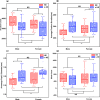Effects of Exercise Habits and Gender on Sports e-Learning Behavior: Evidence from an Eye-Tracking Study
- PMID: 38434961
- PMCID: PMC10909329
- DOI: 10.2147/PRBM.S442863
Effects of Exercise Habits and Gender on Sports e-Learning Behavior: Evidence from an Eye-Tracking Study
Abstract
Background/objective: In the post-epidemic era, an increasing number of individuals were accustomed to learning sports and physical activity knowledge online for fitness and health demands. However, most previous studies have examined the influence of e-learning materials and resources on learners and have neglected intrinsic factors such as experience and physiological characteristics. Therefore, we conducted a study to investigate the effect of exercise habits and gender on sports e-learning behavior via eye-tracking technology.
Methods: We recruited a sample of 60 undergraduate students (mean age = 19.6) from a university in Nanjing, China. They were randomly assigned into 4 groups based on 2 genders × 2 exercise habits. Their gaze behavior was collected by an eye-tracking device during the experiment. The cognitive Load Test and Learning Effect Test were conducted at the end of the individual experiment.
Results: (1) Compared to the non-exercise habit group, the exercise habit group had a higher fixation count (P<0.05), a shorter average fixation duration (P<0.05), a smaller average pupil diameter (P<0.05), and a lower subjective cognitive load (P<0.05) and better learning outcome (P<0.05). (2) Male participants showed a greater tendency to process information from the video area of interest (AOIs), and had lower subjective cognitive load (P < 0.05) and better learning outcomes (P < 0.05). (3) There was no interaction effect between exercise habits and gender for any of the indicators (P > 0.05).
Conclusion: Our results indicate that exercise habits effectively enhance sports e-learning outcomes and reduce cognitive load. The exercise habits group showed significant improvements in fixation counts, average fixation duration, and average pupil diameter. Furthermore, male subjects exhibited superior learning outcomes, experienced lower cognitive load, and demonstrated greater attentiveness to dynamic visual information. These conclusions are expected to improve sports e-learning success and address educational inequality.
Keywords: e-learning; exercise habit; eye-tracking; gaze behavior; gender.
© 2024 Yuan et al.
Conflict of interest statement
The authors declare no conflicts of interest in this work.
Figures



Similar articles
-
Eye-tracking insights into cognitive strategies, learning styles, and academic outcomes of Turkish medicine students.BMC Med Educ. 2025 Feb 20;25(1):276. doi: 10.1186/s12909-025-06855-y. BMC Med Educ. 2025. PMID: 39979922 Free PMC article.
-
Validation of Cognitive Load During Inquiry-Based Learning With Multimedia Scaffolds Using Subjective Measurement and Eye Movements.Front Psychol. 2021 Aug 31;12:703857. doi: 10.3389/fpsyg.2021.703857. eCollection 2021. Front Psychol. 2021. PMID: 34531793 Free PMC article.
-
Impacts of Color Coding on Programming Learning in Multimedia Learning: Moving Toward a Multimodal Methodology.Front Psychol. 2021 Dec 3;12:773328. doi: 10.3389/fpsyg.2021.773328. eCollection 2021. Front Psychol. 2021. PMID: 34925175 Free PMC article.
-
American Medical Society for Sports Medicine position statement: concussion in sport.Br J Sports Med. 2013 Jan;47(1):15-26. doi: 10.1136/bjsports-2012-091941. Br J Sports Med. 2013. PMID: 23243113 Review.
-
Eye-tracking technology and the dynamics of natural gaze behavior in sports: an update 2016-2022.Front Psychol. 2023 Jun 8;14:1130051. doi: 10.3389/fpsyg.2023.1130051. eCollection 2023. Front Psychol. 2023. PMID: 37359890 Free PMC article. Review.
References
-
- Al-Arimi AM. Distance learning. Procedia Soc Behav Sci. 2014;152:82–88. doi:10.1016/j.sbspro.2014.09.159 - DOI
-
- Cidral WA, Oliveira T, Di Felice M, Aparicio M. E-learning success determinants: Brazilian empirical study. Comput Educ. 2018;122:273–290. doi:10.1016/j.compedu.2017.12.001 - DOI
-
- Sun P-C, Cheng HK. The design of instructional multimedia in e-learning: a media richness theory-based approach. Comput Educ. 2007;49(3):662–676. doi:10.1016/j.compedu.2005.11.016 - DOI
LinkOut - more resources
Full Text Sources

